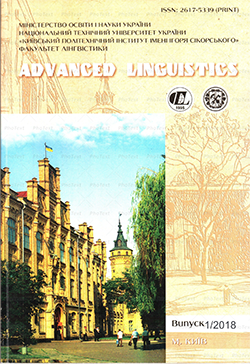SOME LINGUACULTURAL TYPES OF “THE CANTERBURY TALES” (BY G. CHAUCER)
DOI:
https://doi.org/10.20535/2617-5339.2018.1.148826Ключові слова:
The Canterbury Tales, linguocultural type, linguoculture, linguopersonology.Анотація
The article deals with the contemporary studies of the linguocultural types. The research is mainly based on “The Canterbury Tales” by Geoffrey Chaucer, a medieval literary masterpiece that has become crucial for the further development of the English language and literature. Although this literary work has been widely studied and discussed by the different scientists it still lacks the research from the viewpoint of linguocultural studies and linguopsychology. Thus, the authors focus their attention on such characters of “The Canterbury Tales” as the Knight and the Wife of Bath considering them as the linguocultural types of the Knight and Feminist and illustrating their conclusions with the examples from the original masterpiece and its Ukrainian translation. The article briefly outlines the prospects for further study of classical literature in terms of linguocultural, linguopersonological and semiotical studies. The authors believe that the study will contribute not only to the further development of the linguocultural types theory, but also to the in-depth consideration of the types represented in “The Canterbury Tales”, as well as their representatives in the world literary heritage.
Посилання
Afanasiev, I. (2002). Entsyklopediia suchasnoi Ukrainy [Encyclopedia of Contemporary Ukraine]. Kyiv, Ukraine: Vechirnii Kyiv.
Gorbunov, A. N. (2010). Choser Srednevekovyj [A medieval Chaucer]. Moscow, Russian Federation: Labirint.
Demydenko, O. P. (2016). Linhvokulturni typazhi brytantsiv ta ukraintsiv u linhvosemiotychnomu aspekti [Linguocultural character types of the British and the Ukrainian people in linguosemiotic view]. Ukraine: Naukovi zapysky Natsionalnoho universytetu “Ostrozka akademiia” (60), 28-32. Retrieved from http://nbuv.gov.ua/UJRN/Nznuoaf_2016_60_13.
Zherebilo, T.V. (2010). Slovar' lingvisticheskih terminov [Dictionary of linguistic terms]. Nazran', Russian Federation: Piligrim.
Karasik V. I., & Dmitrieva O. A. (2005). Lingvokul'turnyj tipazh: k opredeleniju ponjatija / Aksiologicheskaja lingvistika: lingvokul'turnye tipazhi [Linguocultural type: to the definition of its concept / Axiological linguistics: linguocultural types]. Volgograd, Russian Federation: Paradigma.
Karasik, V. I. (2002). Jazykovoj krug: lichnost', koncepty, diskurs [Language Circle: Personality, Concepts, Discourse]. Volgograd, Russian Federation: Peremena.
Maslova, V. A. (2001). Lingvokul'turologija [Lingucultural studies]. Moscow, Russian Federation: Akademija.
Neroznak, V. P. (1996). Lingvisticheskaja personologija: k opredeleniju statusa discipliny [Linguistic personology: to the definition of a discipline status]. Moscow, Russian Federation: MSU publishing.
Strikha, M. V. (2017). Uliubleni pereklady. Poezii [Favorite translations. Poems]. Kyiv, Ukraine: Penmen.
Chaucer, G. (2017). Kerterberiiski opovidky. Opovid Lytsaria. [The Canterbury Tales. Knight`s tale] (M. Strikha tr.) Ukraine. Retrieved from http://rs-journal.kpu.zp.ua/archive/25-26-2016/16.pdf.
Brewer, D. S. (1994). Chaucer's Knight as Hero, and Machaut's Prise d'Alexandrie. Heroes and Heroines in Medieval English Literature. Great Britain: Cambridge.
Chaucer, J. (1999). Canterbury Tales. London: C. Knight & Co.
Mann, J. (1973). Chaucer and Medieval Estates Satire. The Literature of Social Classes and The general Prologue to The Canterbury Tales. Cambridge, Great Britain: Cambridge.
Robertson, D. W. (1962). A Preface to Chaucer. Princeton.
##submission.downloads##
Номер
Розділ
Ліцензія
Наше видання використовує положення про авторські права CREATIVE COMMONS для журналів відкритого доступу.
Автори, які публікуються у цьому журналі, погоджуються з наступними умовами:
1. Автори залишають за собою право на авторство своєї роботи та передають журналу право першої публікації цієї роботи на умовах ліцензії Creative Commons Attribution License, котра дозволяє іншим особам вільно розповсюджувати опубліковану роботу з обов'язковим посиланням на авторів оригінальної роботи та першу публікацію роботи у цьому журналі.
2. Автори мають право укладати самостійні додаткові угоди щодо неексклюзивного розповсюдження роботи у тому вигляді, в якому вона була опублікована цим журналом (наприклад, розміщувати роботу в електронному сховищі установи або публікувати у складі монографії), за умови збереження посилання на першу публікацію роботи у цьому журналі.

